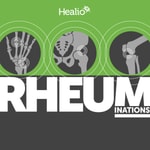The Health Foundation podcast – Details, episodes & analysis
Podcast details
Technical and general information from the podcast's RSS feed.

The Health Foundation podcast
The Health Foundation
Frequency: 1 episode/31d. Total Eps: 54

Recent rankings
Latest chart positions across Apple Podcasts and Spotify rankings.
Apple Podcasts
🇬🇧 Great Britain - politics
26/05/2025#97🇬🇧 Great Britain - politics
23/05/2025#95🇬🇧 Great Britain - politics
22/05/2025#90🇬🇧 Great Britain - politics
21/05/2025#92🇬🇧 Great Britain - politics
20/05/2025#88🇬🇧 Great Britain - politics
02/05/2025#77🇬🇧 Great Britain - politics
13/02/2025#97🇬🇧 Great Britain - politics
19/11/2024#92🇬🇧 Great Britain - politics
16/10/2024#98🇬🇧 Great Britain - politics
09/10/2024#85
Spotify
No recent rankings available
Shared links between episodes and podcasts
Links found in episode descriptions and other podcasts that share them.
See allRSS feed quality and score
Technical evaluation of the podcast's RSS feed quality and structure.
See allScore global : 47%
Publication history
Monthly episode publishing history over the past years.
47: Why are cancer rates rising among younger people? – with Kimmie Ng and Charles Swanton
Episode 47
jeudi 12 septembre 2024 • Duration 37:46
Scientists are racing to understand what’s driving these trends. Some evidence points to roles for established risk factors – including smoking and obesity. But some research is also exploring environmental exposures – such as microplastics and forever chemicals – and asking if these could be changing the microbiome and potentially causing inflammation within the body.
So what do these trends mean for cancer research, for health services and national policy? And faced with such stark trends, where are there grounds for hope?
To discuss, our Chief Executive Jennifer Dixon is joined by:
- Kimmie Ng, specialist in oncology and Director of the Young-Onset Colorectal Cancer Centre at the Dana Farber Cancer Institute in Boston, and Associate Professor of Medicine at Harvard Medical School.
- Charles Swanton, Deputy Clinical Director at Francis Crick Institute, Chief Clinician at Cancer Research UK, and a consultant oncologist at University College London Hospitals NHS Foundation Trust.
Nature Reviews Clinical Oncology (2022). Is early-onset cancer an emerging global epidemic? Current evidence and future implications.
BMJ Oncology (2023). Global trends in incidence, death, burden and risk factors of early-onset cancer from 1990 to 2019.
Gupta S et al (2023). Birth Cohort Colorectal Cancer (CRC): Implications for research and practice.
Financial Times (2023). The unexplained rise of cancer among millennials.The New England Journal of Medicine (2024). Microplastics and nanoplastics in atheromas and cardiovascular events.
Cancer Grand Challenges. Team OPTIMISTICC: Opportunity to investigate the microbiome’s impact on science and treatment in colorectal cancer.
The Health Foundation (2023). How chronic stress weathers our health.
The Health Foundation (2024). Rising cancer incidence in younger adults: what is going on? (Forthcoming)
46: A new government and health after the general election: part 2 – with Hannah White and John McTernan
Episode 46
vendredi 19 juillet 2024 • Duration 31:18
While the public might show patience for a few months, they will expect to see some results quickly – and health is a top priority for voters. So how is the new government going to navigate these tensions? What will being ‘mission-led’ mean in practice? And where is the money going to come from?
To discuss, our Chief Executive Jennifer Dixon is joined by:
- Hannah White, Director and CEO of the Institute for Government.
- John McTernan, Senior Adviser at BCW Global. John was formerly director of political operations for the Labour government from 2005 to 2007.
37: What do the main political parties really have in store for health? – with Rachel Wolf and Stephen Bush
Episode 37
vendredi 20 octobre 2023 • Duration 35:04
The health service regularly tops voter concerns, consumes a growing share of public spending and features daily in the media. The health of the nation is also moving up the agenda, with ill health the main reason why 2.6 million working-age people are economically inactive.
So what are the main parties planning as we move towards an election and have the party conferences revealed anything new?
To discuss, our Chief Executive Jennifer Dixon is joined by:
- Rachel Wolf, Partner at Public First, a consultancy specialising in public policy, public opinion and campaign strategy.
- Stephen Bush, Associate Editor and Columnist at the Financial Times.
Show notes
The Health Foundation (2023). Health in 2040: projected patterns of illness in England.
The Health Foundation (2023). Public perceptions of health and social care: what are the priorities ahead of a general election?
The Health Foundation (2023). What should be at the top of the political agenda for health and care?
The Health Foundation (2023). Health Foundation responds to the Prime Minister’s announcement of smoke-free measures.
The Health Foundation (2023). Social health insurance: be careful what you wish for.
Institute for Government (2023). The NHS productivity puzzle: why has hospital activity not increased in line with funding and staffing?
The Times. Tories as the party of change: that’s a hard sell (2023).
Ipsos. Ipsos issues tracker: July 2023 (2023).
36: Going private: what’s happening and is it a bad thing? – with Sarah Neville and Hettie O’Brien
Episode 36
vendredi 29 septembre 2023 • Duration 38:09
Meantime policymakers are exploring how the independent sector can help get waiting lists down, and private equity investors are making moves in the independent health care provider market.
So does this mean we’re slowly sliding towards a mixed model of health care in this country? And if so, is it a good thing or should we be worried?
To discuss, our Chief Executive Jennifer Dixon is joined by:
- Sarah Neville, Global Health Editor at the Financial Times.
- Hettie O'Brien, Assistant Editor at the Guardian and currently researching a book investigating the role of private equity in the contemporary economy and public services.
- The Health Foundation (2023). Waiting for NHS hospital care: the role of the independent sector in delivering orthopaedic and ophthalmic care.
- The Health Foundation (2023). How the public views the NHS at 75.
- The Health Foundation (2022). Waiting for NHS hospital care: the role of the independent sector.
- BMJ (2023). Private providers see surge in demand as PM blames long NHS waiting lists on strikes.
- PHIN (2023). PHIN Private market update: September 2023.
- BMJ (2023). Evaluating trends in private equity ownership and impacts on health outcomes, costs, and quality: systematic review.
- NBER (2023). Owner Incentives and Performance in Healthcare: Private Equity Investment in Nursing Homes.
- The Guardian (2023). Private equity has its sights on the NHS – and with it our faith in public services altogether.
- The Financial Times (2023). Private equity groups bet on UK healthcare as NHS waiting lists grow.
35: Our health in 2040: are we getting sicker? – with Jeanelle de Gruchy and Kevin Fenton
Episode 35
vendredi 8 septembre 2023 • Duration 33:06
Recent Health Foundation modelling estimates 1 in 5 will be living with major illness by 2040, mostly because more of us will be older. But it's not just about age. A record 2.5 million working-age people are already not in work due to ill health. So what can be done to improve the state of nation’s health?
To discuss, our Chief Executive Jennifer Dixon is joined by:
- Jeanelle de Gruchy, Deputy Chief Medical Officer for England and lead for the Office for Health Improvement and Disparities at the Department of Health and Social Care.
- Kevin Fenton, President of the UK Faculty of Public Health.
Show notes
- The Health Foundation (2023). Health in 2040: projected patterns of illness in England.
- UK government (2023). Major conditions strategy: case for change and our strategic framework.
- ONS. Rising ill-health and economic inactivity because of long-term sickness, UK: 2019 to 2023.
- The Health Foundation (2022). Addressing the leading risk factors for ill health.
- The Health Foundation (2022). Is poor health driving a rise in economic inactivity?
- The Health Foundation (2022). Health is wealth? Strengthening the UK’s immune system.
- UK government (2021). Chief Medical Officer’s annual report 2021: health in coastal communities.
34: NHS at 75: The huge promise of technology – with Navina Evans and Penny Pereira
Episode 34
vendredi 28 juillet 2023 • Duration 38:43
In this third and final installment, we ask how the potential of technology might be unlocked to benefit patients, the public, staff and the taxpayer. We also share initial reflections on the recently published NHS Long Term Workforce Plan.
To discuss, our Chief Executive Jennifer Dixon is joined by:
- Navina Evans, Chief Workforce Training and Education Officer at NHS England. Navina is a doctor and a specialist in psychiatry, and was involved in the new NHS Long Term Workforce Plan.
- Penny Pereira, Q Managing Director here at the Health Foundation. Penny is an expert in process and system redesign and health care, having worked in these areas for many years, both at the Foundation and previously within the NHS.
Show notes
- The Health Foundation (2020). Understanding and sustaining the health care service shifts accelerated by COVID-19.
- The Health Foundation (2021). Securing a positive health care technology legacy from COVID-19.
- The Health Foundation (2023). Five principles for implementing the NHS Impact approach to improvement in England.
- NHS England (2023). NHS Long Term Workforce Plan.
33: NHS at 75: Is political leadership up to the challenge? – with Alan Milburn and Stephen Dorrell
Episode 33
jeudi 29 juin 2023 • Duration 31:55
This second episode explores the role of political leadership in addressing the big challenges in health care, whether political leadership is up to the task of getting the NHS to its 100th anniversary – and if not, how could it improve?
To discuss, our chief executive Dr Jennifer Dixon is joined by:
- Alan Milburn, Labour MP for nearly 20 years to 2010. During the Blair government, Alan held a number of ministerial roles including Secretary of State for Health from 1999 to 2003. Alan currently serves as chair of the Social Mobility Foundation and Chancellor of Lancaster University.
- Stephen Dorrell, Conservative MP for over three decades to 2015. Stephen served as Secretary of State for Health from 1995 until the 1997 general election, and as chair of the House of Commons Health Select Committee from 2010 to 2014. Since leaving parliament, Stephen spent time as chair of NHS Confederation, and joined the Liberal Democrats.
- Institute for Government (2019) Becoming secretary of state
- The Health Foundation (2020) Glaziers and window breakers: former health secretaries in their own words
- The Health Foundation (2021) The most expensive breakfast in history
32: NHS at 75: What are we up against? – with Professor Jagjit Chadha and Anita Charlesworth
Episode 32
mercredi 31 mai 2023 • Duration 35:37
As we approach the NHS’s 75th birthday in July, we’re launching a series of three podcast episodes setting out the big questions facing the health service. This first episode explores current pressures on the NHS, economy and wider society and what the future might hold.
What are the questions that policymakers may face as the population’s health and care needs change over the coming decade? How can the UK economy power the investment needed for health services to survive and thrive? And how can more long-term thinking help to foster good health and economic productivity?
To discuss, our chief executive Dr Jennifer Dixon is joined by:
- Professor Jagjit Chadha, Director of the National Institute of Economic and Social Research and chair of the UK Productivity Commission
- Anita Charlesworth, Director of Research and the REAL Centre at the Health Foundation.
Chadha (2023). ‘Commentary: fixing the mix’. National Institute Economic Review.
Office for National Statistics (2022) National population projections
Health Foundation (2022). How many hospital beds will the NHS need over the coming decade?
Health Foundation (2022). How does UK health spending compare across Europe over the past decade?
Health Foundation (2022). NHS workforce projections 2022
Health Foundation (2022). Health is wealth? Strengthening the UK’s immune system
31: How chronic stress weathers our health – with Dr Michelle Kelly-Irving and Professor Nish Chaturvedi
Episode 31
lundi 8 mai 2023 • Duration 33:56
Chronic exposure to psychosocial stress – for example, poverty or other disadvantage – leads to prolonged strain on the body. This weathering can make us physically ill before our time and prematurely age us.
So what is psychosocial stress, how does it harm our health and what can be done about it?
To discuss, our chief executive Dr Jennifer Dixon is joined by:
- Dr Michelle Kelly-Irving, a life course epidemiologist working on health inequalities and the social determinants of health. Michelle is a director at Inserm in Toulouse, part of France's National Institute of Health and Medical Research.
- Professor Nish Chaturvedi, Professor of Clinical Epidemiology at University College London and Director of the Medical Research Council Unit for Lifelong Health and Ageing.
- Kelly-Irving (2019). Allostatic load: how stress in childhood affects health outcomes. The Health Foundation.
- Gustafsson et al (2011). ‘Socioeconomic status over the life course and allostatic load in adulthood: results from the Northern Swedish Cohort.’ Journal of Epidemiology and Community Health. 65: 986-992.
- Guidi et al (2021). ‘Allostatic load and its impact on health: a systematic review.’ Psychotherapy and Psychosomatics. 90: 11-27.
- McEwen & Stellar (1993). ‘Stress and the individual – mechanisms leading to disease’. Archives of Internal Medicine.153: 2093-2101
- Tampubolon & Maharani (2018). ‘Trajectories of allostatic load among older American and Britons: longitudinal cohort studies.’ BMC Geriatrics. 255.
30: AI in health care: hope or hype? With Professor Sir John Bell and Dr Axel Heitmueller
Episode 30
vendredi 24 mars 2023 • Duration 33:58
AI will transform medicine, AI will allow doctorless screening and personalised prevention, AI will boost productivity, AI will make thousands of jobs redundant – so go all the claims.
But is this hype or real hope? How will AI transform health and care services and the experiences of staff and patients? What’s been the progress so far? And how best to move forward safely? And with growing demand, staff shortages and a public spending squeeze, could AI be a key answer to sustaining the NHS itself?
To discuss, our chief executive Dr Jennifer Dixon is joined by:
- Professor Sir John Bell, Regius Professor of Medicine at the University of Oxford and an adviser to the government on life sciences strategy, and to Sir Patrick Vallance’s current review of how to regulate emerging technologies.
- Dr Axel Heitmueller, Managing Director of Imperial College Health Partners. Axel has also worked as a senior analyst in the Cabinet Officer and Number 10 Downing Street.
Health Education England (2022) AI Roadmap: methodology and findings report
Health Education England (2019) The Topol Review: Preparing the healthcare workforce to deliver the digital future
The Health Foundation (2021) Switched on: how do we get the best out of automation and AI in health care?
HM Government (2021) National AI Strategy
HM Government (2018) Artificial intelligence sector deal
HM Government (2017) Industrial Strategy: Building a Britain fit for the future









